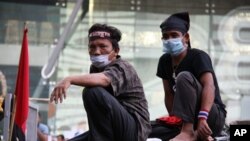The Thai capital, Bangkok, is relatively quiet, despite authorities refusing to negotiate with anti-govenrment protesters until they end their nine-week occupation of a central commercial area. Soldiers have surrounded the demonstrators for a fifth day to pressure them to leave, leading to sporadic clashes that raised the death toll to 68 people killed since April.
Earlier, hopes for a ceasefire were raised when a group of Thai senators offered to mediate peace talks between the government and protest leaders, who welcomed the offer. But Thai authorities dug in their heals, refusing talks until after the protesters leave.
The government set a Monday afternoon deadline for anti-government demonstrators to disperse, but it was ignored and around 5,000 demonstrators remain in the camp. Authorities have warrants out for several protest leaders they label "terrorists."
On national television, army spokesman Colonel Sansern Kaewkamnerd gave an example of one protest leader, Nattawut Saikua, behaving like a terrorist. The spokesman quoted Saikua as saying he was able to rally demonstrators who were inciting chaos in many areas of Bangkok back to the main protest site.
Since Thursday, soldiers have formed a blockade around the demonstrators to cut off their supplies and prevent supporters from joining them. Heavily armed soldiers have been searching cars and motorcycles near the protest areas for weapons and supplies and are detaining visibly nervous protesters.
Angry demonstrators have fought sporadic street battles armed mainly with slingshots, fireworks, and gasoline bombs.
The government says they also fire guns and grenades at soldiers, although all those killed and most of those wounded since Thursday are protesters and civilians.
Near one of the major clash sites at Din Daeng intersection, a man named Somsak shows journalists a bandaged wound on the side of his chest. He said just a few days ago, he was watching the street fighting when he was shot. Somsak said he was shot by a sniper after he looked to see what was happening and then tried to hide.
Pressure has been mounting for negotiations because of fears the Thai military is preparing a final crackdown against the protester camp.
One protest leader, Weng Tojirakarn, said he fears the situation could escalate to civil war.
"If you start the war by killing us here, tightening your encirclement, and in the final come in with the brutality and kill - maybe more 500 people or maybe 1,000 people - can you think that this solves everything? Can you solve this political crisis by war? By more dead men?"
The government has declared a city wide holiday for this week. The financial and tourist district on Silom Road, under military guard, is largely deserted, like most of central Bangkok.
The protesters, known as Red Shirts, largely support former prime minister Thaksin Shinawatra and want the government to resign and call new elections. Thaksin was overthrown in a coup in 2006, but is supported by the rural and working poor. Many in Thailand's middle class and urban elite accuse him of corruption and abusing his power.
Related Report by VOA's Brian Padden















